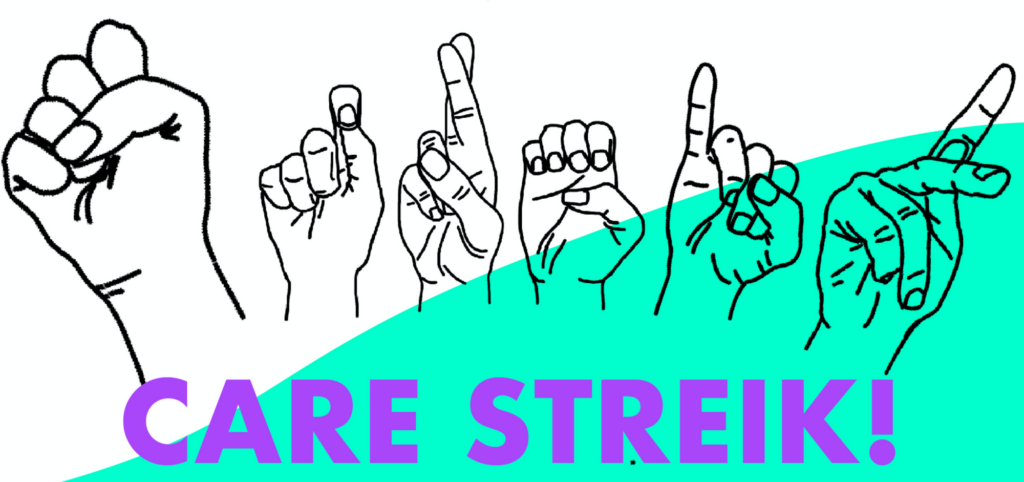Feminist organisation against the care crisis

Care work is central to the functioning of society. It is the basis for the well-being of all. Care work means the care for others and the care for oneself. This work is mainly carried out by women*, trans*, inter* and genderqueer* (FTIQ*) people, especially migrants and those who rely on their salaries. Often at low wages, miserable working conditions, invisible or unpaid. Enough!
Paid care work
It ensures that care in hospitals, at Spitex, in old people’s homes and nursing homes, that cleaning, care in daycare centers and kindergartens, sex work and the education system can function. It is a feminized occupational field. That means, the work is „naturally“ attributed to women and receives low recognition. Therefore, wages are classified low, working conditions remain poor and the activities pose a health risk for the workers.
Underpaid care work is often passed on to migrants, who in turn are exposed to even worse working conditions and run the risk of not being paid social benefits. At the same time, it is ignored that care is a task for society as a whole and cannot simply be passed on to precarious groups of people.
Unpaid care work
Care work is also shifted to FTIQ* in the private context of family and cohabitation. This leads to a devastating multiple burden for many FTIQ*. Most of the time, they are the ones who take care of others emotionally, remember birthdays and offer comfort. This is also work and requires energy! This puts a tremendous double burden on them. The official working day is extended by hours, but the care work performed free of charge and privately is not recognized as work.
Why care work is on strike 6/14-21
- The pandemic makes it clearer than ever: it is not the CEOs, bankers, real estate owners, pharmaceutical manufacturers or technology entrepreneurs who keep our society alive – but all care workers. Mutual care counts more than profit. We don’t want to go back to the unsolidary „normality“.
- FTIQ* perform lifelong unpaid care work. Since this work is not remunerated, it is also not recorded for old-age provision. Therefore, the risk of poverty in old age is very high.
- Care work is not only performed, but also maintained. The need for care is also devalued. The meritocracy considers only „healthy“ people to be useful. At the same time, this „health“ becomes a question of „getting paid,“ a commodity that can be marketed. Access to care is also not fairly regulated: If you are affected by racism, transphobia, or don’t have regular residency status, access to Care is made more difficult.
- Already during the feminist strike in 1991, making (un)paid care work visible was one of the central issues. Until today, still far too little has changed. Therefore, 30 years later we are still striking and fighting for a solidary society in which mutual care is at the center!
How can you help shape June 14?
Strike in regards to care and domestic work on this day. Take action: Together with friends, mothers, neighbors, publicly and in the immediate environment. Point out the prevailing grievances and the invisible care work. Make noise in these collective moments all over Switzerland!
Announce your action on the website – so it becomes visible how diverse strikes are!
Be creative! Be loud and colorful! June 14 belongs to all of us!